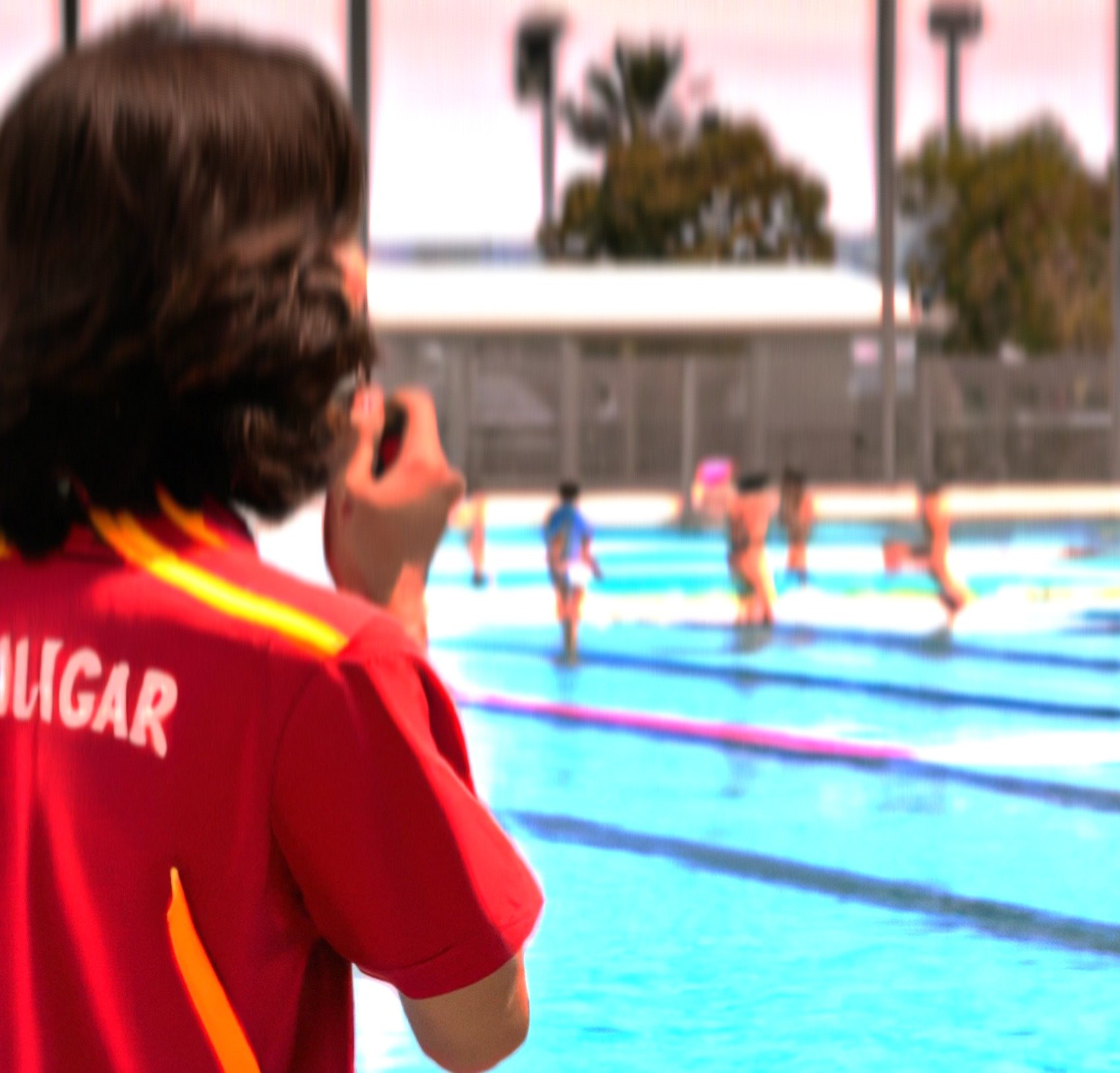DON TELEVISION / BOBBY'S WHISTLE
On the utmost plank of the community pool’s three-tiered array of diving boards, a boy stands, dripping, little beads of moisture in rivulets down from his otter-slick hair, chasing each other, the beads, tracing a network of shiny streams and tributaries that, from my vantage, look a little bit like satellite imagery would, of an ancient, then-wet Mars, cuz he’s tan, the boy, or at least red, his sunburn here giving his skin the appearance of sculpted clay. And he’s shivering, either from fear, or indecision, or the breeze up there, pausing mid-pause to peer over the diving board’s left edge to the concrete below, concrete which seems like it should be besides the point, a non-factor in whatever calculus going on up top that’s preventing him from jumping. He’s been standing there for what feels like an hour, though for him it must seem even longer, an eon, enough for those streams, those tributaries to start to feel like they’re carving canyons in the clay of his skin, for his skin, his hair to start to dry, and the sunburn to crack, so that the plunge will feel icy, all the more assaulting, if it even happens at all. In real-time, something I feel only a tenuous grasp on and relation to here, from the lofty heights of the lifeguard station, it’s been maybe ten minutes. And maybe ancient Mars was green, lush, a poor metaphor. He’s just getting redder.
I swore this summer I would stop taking mondo doses of lysergic acid before I was supposed to go on-duty as a lifeguard. I swore I would stop using words like sick and tubular and mondo to describe things, but I haven’t. Actually, I would say it’s gotten harder not to. I think my proximity to the pool cleaning chemicals and the daily glare from the sun on the water have done something really gnarly to my brain. The things I used to do to be funny or ironic have since gotten sincere and/or serious. Like I grew a mullet to go with the mustache, and now I like the mullet. Like it seems like it’s a part of me, the “thing that I am doing,” and less like a costume, even if sometimes, when I see my reflection coming apart on the surface of the water, I do not recognize myself. When I see my reflection on any surface, be it the pool, or the mirror in the men’s changing room, or the rear and/or side view mirrors of my Volkswagen Jetta, there is a momentary lapse where I must remind myself that I am behind the wheel, that I, myself, am piloting the organic mech-suit that stands, at rest, before whatever reflective surface is in front of me, that I am not merely viewing an oil painting called “Man with Mullet,” or “Man with Mustache.” In those moments, without trying to or wanting to, I sometimes think about that tiny alien in 1997’s Men in Black that resides within a character’s head. I think about the series of levers and foot pedals in the guy’s head with the alien and what they could conceivably control. I think about how, as a plot point, when the character is murdered, the alien dies with him, and what that says about the soul and its continuation after death. I think about dying in someone else’s head. These are only some of the things I have to contend with.
Luckily, the resultant tolerance from taking acid is such that you can’t really abuse it. Like if I take it and go to work one day, I won’t be able to do it again for like a week. This allows me time to recuperate and reckon with all I have seen and thought and felt, and in my opinion, makes it The Perfect Drug. To be honest, on the days that I am on it, I feel I am a more effective lifeguard. I take my position at the pool more seriously. I denominalize the word, separating and reversing its conjunctive components, that is, I guard life, life being that ineffable essence, that tiny alien that resides within all of us, most palpably in children kicking and splashing in the community pool, fashioning great sailing ships from inflatable tubes, learning, against all odds and the shark of death itself, to swim. I’m able to cut through the chaos of all that kicking and splashing to see it as more synchronized than might a sober person. Lathered in sun tan lotion, with my pupils at peak dilation beneath polarized shades, I am like a monitor lizard whose every predatory impulse has been turned toward the protection, the guardianship of life. When I blow my whistle, the sound of it is an air raid siren, a samurai sword that slices the ambient auditory fabric of the afternoon. I soar through the resultant gash, to any floundering infant, as the extension of God’s Own Hand.
A line is forming behind Bobby. Bobby is the boy’s name, assimilated into my consciousness from the jeering shouts of onlookers. This takes an inordinate amount of time. Normally, with children’s names, I am quick on the uptake, hoovering them from the heretofore mentioned auditory fabric like the contents of a poolside juicebox. At any one time I might know and be using, in telepathic parlance, something like thirty different children’s names, warning them, when I see premonitory signs of horseplay, of forbidden games of chicken, with my mind. I like to keep my whistle as a last resort, for when there’s static in the signal.
The static in today’s signal is that my name is also Bobby.
A period of recalibration is in order, to account for the latency, in which I realize that the voices crying Bobby are the children, but that the Bobby isn’t me, there’s another Bobby, and he might need help. The word Help loses all formal connection to the English language, the word Bobby to myself, both blaze across my cranial empyrean as if skywritten by plane, the same way I feel that simple commands must, when issued to K9 units, and I am launched into action, the action here being a frontside dive into the shallow end of the pool from the full height of the lifeguard station’s white-painted scaffolding. The action here, while technically unnecessary, and yes, dangerous, and sure, a bad example, feels altogether integral to the tension and drama of the moment, a service to both Bobbies, my life now feeling like the best parts of 1997’s Free Willy 3: The Rescue, my mullet, stiff from the chlorine, spoiling airflow. And my whistle? Well, you can imagine what sound it’s making. And if you can’t, I’ll tell you.
It’s the call of an eagle.
Beneath the water, it’s something like widahwidahwidahwidah and erupting with bubbles, little curtains of them. It’s the only part of the auditory fabric down there with the disembodied legs, the single square of the quilt, and my heart all at once goes out to every dolphin ever given LSD by the U.S. government. How lonely it must have been for them, to see all things as various cuts of fabric, as swatches, and to lack all terminology to describe it, to be the principal subject of an experiment that has begun and ended without your ever knowing it had even happened at all, and, when faced with vast, empty leagues of ocean, to feel insane. I think about a dolphin’s brain, how it looks exactly like a human brain as designed by a person on acid, caught midway through the process of duplicating itself, the dolphin’s brain, in a kind of arrested mitosis. I think about Melon Brains, an obscure adult edu-tainment game about dolphin biology released for Pioneer’s LaserActive system in 1994, how the people that designed that were almost certainly on acid during several key stages of the game’s development. I realize it’s been a long time since I’ve had any oxygen or thought about Bobby in any sense of the word, much less its distant cousin Help.
At the bottom of the pool, with all its scintillating light refractions and suspended particulates and my polarized shades slow-mo drifting from my face, there’s a kind of quiet antithetical to my own up top calculus, which, at this point, is pure noise: shifting walls of scribbled text, sometimes numbers. When it occurs to me that my dying down here would be bad optics, leading, potentially, to a damning toxicology report poorly reflective on the pool’s management staff, I start to swim. It feels crazy. It also feels right, atavistic, a return to a baser form of functioning retained in the vestigial memory of all Earth-life, that is, the kick, the paddle, the serpentine shimmy through warm waters, the feel of which is frictionless, amniotic. I am one with that which I’ve sworn to protect, alive, not dying. When I surface, somewhere in the deep end, the Other Bobby looms above me as the nautical figurehead of an oncoming ship.
And so the call is to rise, like all my protozoan brothers before me, to blast my whistle with the full force of my lungs, as if I never needed the oxygen at all. I mount the high dive’s ladder with all the sure-footed certainty of the ascendant monitor lizard, with the sound, as I’ve noted, of an eagle. The introductory notes of what could be my theme song are suggesting themselves to me with each rung, and on the running, wax-like faces of the children is what I’ll call awe.
That the high dive is too high, maybe negligently high in relation to the average pool guest’s own waist-level height and accordant swimming capability, is a question, a problem well above the lifeguard’s concern and payscale, is merely another impediment to be overcome, to be accounted for, like the abrupt shift of the ladder’s rung composition to a liquid, snake-like material, sentient and singularly bent on eluding his grasp, or his own internal monologue’s sudden embrace of the third person, both of which, like the previous action of his shallow-end frontside, feel tension-and-drama-serving and/or right, like deliberate, cinematic choices in the summer blockbuster of his life. That the lifeguard feels somewhat less sentient, but no less singularly-possessed than the very rungs of the ladder he is moved to climb, then, is natural, understandable, for in this movie he is both actor and spectator. So imagine his shock, his confusion, and then his dawning acceptance when, upon reaching the top of the high dive to comfort and/or encourage and/or rescue the Other Bobby, he finds him there, with his back turned, still paralyzed with fear, and on the nape of his neck not the trim, conservative edges of a crew-cut, but a ratty, rebellious continuation thereof, only a quarter-inch or so, but surely, without doubt: a mullet.
Bobby turns to the lifeguard. The lifeguard mouths his name. Bobby shrieks, jumps.
Having failed, or maybe succeeded, the lifeguard remains, at the pool’s highest point, convinced of some harrowing transpiration within himself. He begins to blow his whistle.
Don Television is an American writer. His fiction has been featured in hex, Identity Theory, and Misery Tourism. Reach out: donatello.vision.

